Reading | New Discovery Drama Hong Shen Two Tongxiang Capital Examination Explanation
Author:Report Time:2022.08.15
The author recently discovered the autographs of the two -pass Hongshen Department of Social Education in China in the Second Historical Archives of China. He has not seen the income of "Hongshen Collection", "Hongshen Research Collection", "Hong Shen: Memories Hongshen Collection", "Hong Shen's Collection", "Hongshen Collection", "Hong Shen's Collection", "Hong Shen's Collection", "Hong Shen's Collection", "Hong Shen's Collection", "Shenwen Copy" "Hong Shen Drama Paper Collection" and other research results or other research results. In addition, Hong Shen also archived Hong Shen as a selection member and participated in the relevant historical materials of the anti-Japanese script organized by the Ministry of Education. During the year, the drama script was selected for the theme of the Anti -Japanese War. On March 23, 1940, the 162 anti -Japanese -war script applied for the final review was completed. Hong Shen reviewed 21 drama scripts and received 100 yuan in remuneration on May 16, 1940. These contents have not been seen in the records of "Hongshen Chronicles", "Hongshen Biography" and "Board of Hongshen Chronicles". Try to organize the two letters and historical materials, and slightly exist.
In December 1938, the Ministry of Education "rewarded the creation and strengthened the publicity, and planned to publicize the relevant anti -Japanese war, drama and opera script, strictly selected the masterpieces, and issued the performance of various theater troupes" The document "(5) 11981), and the National Academy of Drama Sciences proposed the" Measures for the Ministry of Education for the Anti -Japanese War ". On April 7, 1939, the Minister of Education Chen Lifu sent a letter to Yu Shangyu, Wanjiabao, Zhao Taizhen, Hong Shen and other letters. Related documents of the script method "(5) 11977). The full letter is recorded as follows:
Minister Lifan Xun Jian:
Respectors, yesterday applauded a letter and solicited the organizational rules of the Anti -Japanese War Script Selection Committee and solicited the anti -Japanese script methods. Essence Please
Xunan.
Brother Hong Shenqi
April 10th
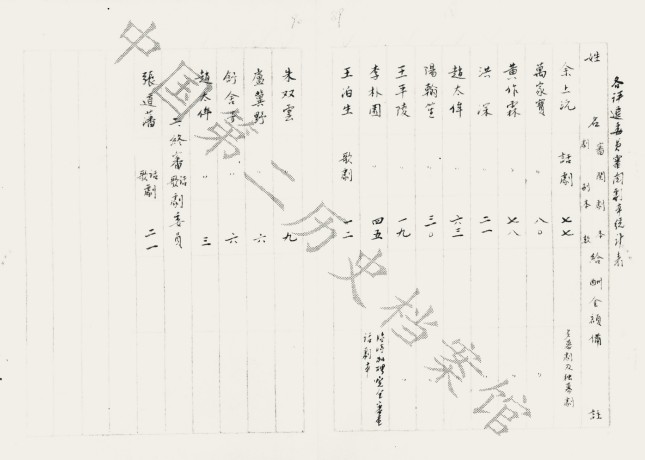
Thirteen Anti -Japanese War Selection Members Review the script statistical table print
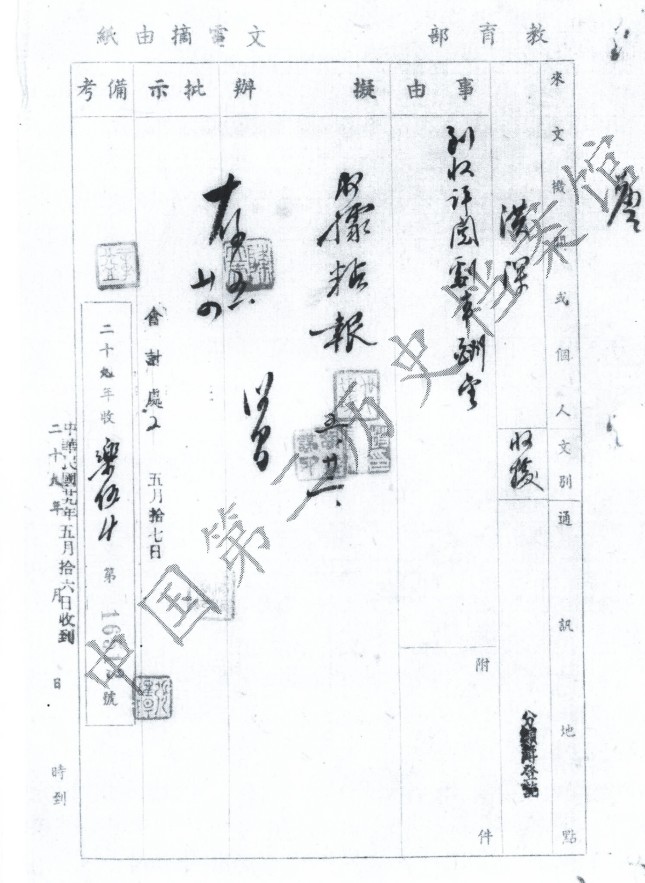
Hong Shen reviewed the receipt of the script reward
Hong Shen is a well -known drama educator, and has always supported the student's drama. In 1944, the Department of Social Education of the Ministry of Education formulated the management rules of school acting and solicited the opinions of experts in the drama industry. By May 16, 1945, only Hong Shen's letter was received. The "School Performance Management Rules" is divided into four parts: general, theater management rules, background management rules, and rehearsal management rules. Each part is divided into several rules. In the letter, Hong Shen put forward suggestions on the third article of the "General Principles", as well as the fifth and sixth paragraphs of the "Accounting" of the second part of the "theater management rules" and the seventh paragraph of "hospitality". Hong Shen believes that in the "Rules", "Accountants' login accounts should use new thin records" and the accounts of school dramas are settled, "no (author Note: to the competent authority) request to make up for losses" may not work, " The "entertaining personnel check the theater is completed after the secondary layout, and the number should be pasted first" is unnecessary. At the same time, he suggested that the formulation of various rules should be as simple as possible and for example. ("Related documents for the management and review methods of the Drama Rewarding Subsidies and Examinations of the Ministry of Education", (5) 11976) The full letter will be recorded as follows:
Respector:
The school's acting sets the management rules, which is more irresistible, but the draft seems to be cumbersome. Article 2), if it is changed to ten principles, it seems that it is easier to remember, and it is still begging.
As appropriate, the eight characters of "Specializing in the Performance Civilized Drama" can be deleted. The farce is one of the figures, and it is listed as the main form of the same type of drama as the tragedy comedy. In the theory of drama, "Ha Menglert" is also farce, ancient Greek masterpieces, nineteen are all farce. Civilized dramas are "performances without scripts" and the terms are "improvisational performances". Both of them are form.
Department of Social Education
Hong Shenqi
Twenty -three, nine, twenty
Article 3 of the "General Principles" of the "School Performance Management Rules" is "school acting should be based on education, not to cater to the low -level interest of society, and perform farce of the drama civilization drama." The eight characters of the far -reaching civilization drama, such as the "deletion of the character, etc., this suggestion reflects his awareness of the farce and civilized drama. As early as 1929, in order to popularize foreign drama terminology in China, Hong Shen had serialized the "Interpretation of Terms" in the 6th issue in the "Gossip · Drama Weekly" of the Republic of China. According to the "Board of Hongshen Year": "The Interpretation of the Terms" explained (1) the drama; (2) the theater; (3) the farce; (4) the tragedy and comedy; ; (6) Fun drama; (7) Story; (8) plot; (9) complement; ) Snake feet; (14) Terms of tension or Guanzi. "And labeled" When the "Hongshen Paper Collection" is marked, delete the 'drama', 'theater', 'farce' and 'Zhang Ben' several sections , And adjust the text. "(Ancient and modern, Yang Chunzhong's" Editor of Hongshen Chronicles ", China Drama Publishing House, 2008, p. 90-91) The author through inspection, comparing the original text and inclusion of the" Gossip · Drama Weekly "in" Gossip · Drama Weekly ". The multi -version collection of this article found that the relevant expressions of "Long Editor" were incorrect. First of all, the earliest article "Interpretation of the Term" was the "Hongshen Drama Paper Collection" issued by Tianma Bookstore in 1934, and the entitled collection of the papers was selected and edited by Hong Shen himself. As Hong Shen said in "Self -preface": the text "should have to be modified", "I have also modified it within possible scope." ("Hongshen Drama Paper Collection", Tianma Bookstore, 1934, p. 2) When Hong Shen deleted the interpretation of the term "interpretation of the term", not only "deleted 'drama', 'theater', 'Tazaka' and 'Zhang Ben 'Digital sections, and adjusted the text preface ", also increased the article" Content and Skills "(with cutting) in the form of" appendix "in the form of" appendix "(No. 13, 14). (Author's note: Later, when "Hong Shen's Collection" was compiled in the article "Interpretation of the Term", he made a small change on the basis of "Hongshen Drama Paper Collection" - The content and technique "directly changed to the text) Second, the fifth part of the original" Interpretation of Terms "is not the" original lack "contained in the" Long Editor ", but the" tragedy "and" comedy "are classified as fourth. Five parts. "Daily, Gossip · Drama Weekly" November 27, 1929
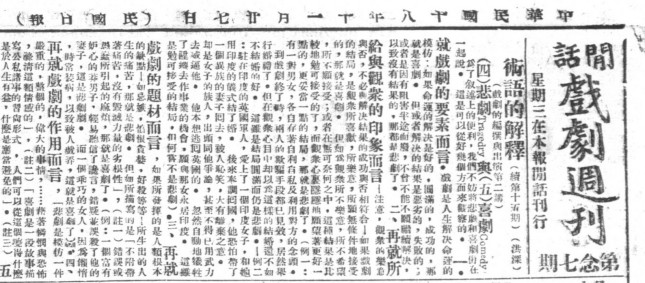
In the original "Explanation of the Term", Hong Shen believes that farce is a form of drama, which has the characteristics of "the plot is completely dominated by personality". Due to the farce, "good people and bad guys are extreme, and the plot is complicated and increasing, and it constantly happens. This is not true for life, so the word farce has also become a malicious noun." (Explanation of Hong Shen's "Terms: (3) Melodrama", "Republic of China Daily · Gossip · Drama Weekly" (No. 15) September 4, 1929) September 1929) September 4) It is not malicious. " After the outbreak of the Revolution of 1911, some international students who founded Harukee in Tokyo, Japan returned to China one after another, and began the domestic acting activities of the Chunliu School. Emerge. From 1910 to 1913, the new drama centered on Shanghai was unprecedentedly prosperous, and the acting activities were very active. (Chen Baichen and Dong Jian edited "Draft of History of Modern Chinese Drama", China Drama Publishing House, 2008, p. 8) Later, with the increasing number of civilized opera groups, "drama and actors, at the same time, failed", "civilization", "civilization", "civilization", "civilization", "civilization", "civilization" The drama "gradually became" humble noun ". (Hong Shen's "Speaking of Drama from the New Drama in China-Preface Ma Yanxiang's" Introduction to Drama> "," Hong Shenwen Copy ", People's Literature Press, 2005, p. 93-96) It can be seen that Hong Shen's judgment of the farce and civilized drama is from the perspective of the occurrence and from a historical perspective. He believes that the two are two forms of drama, and there is no contemporary content. Civilized drama and "low -level fun" equation.
Hong Shenjin's pen letter print
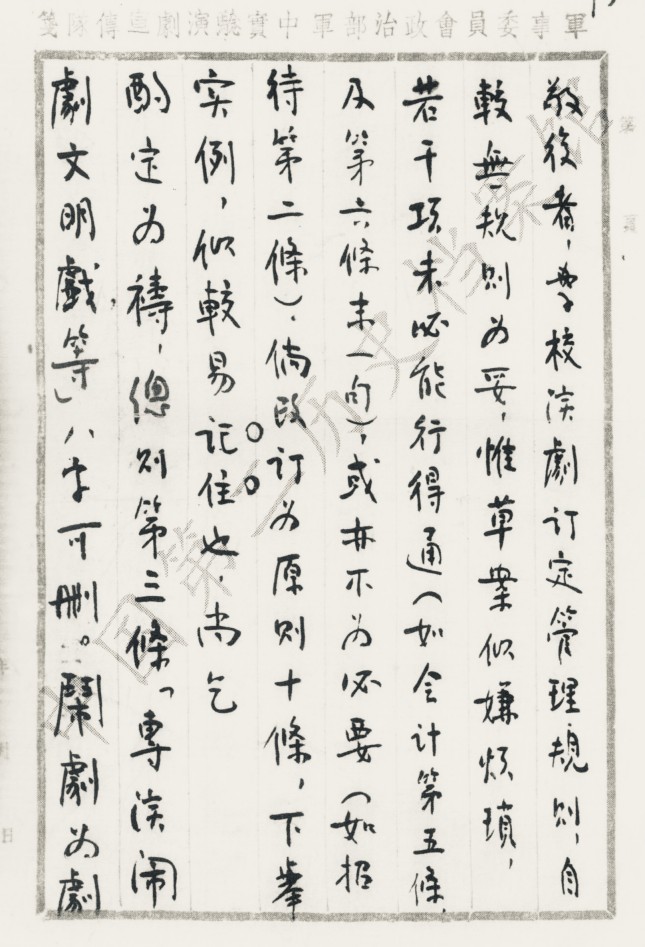
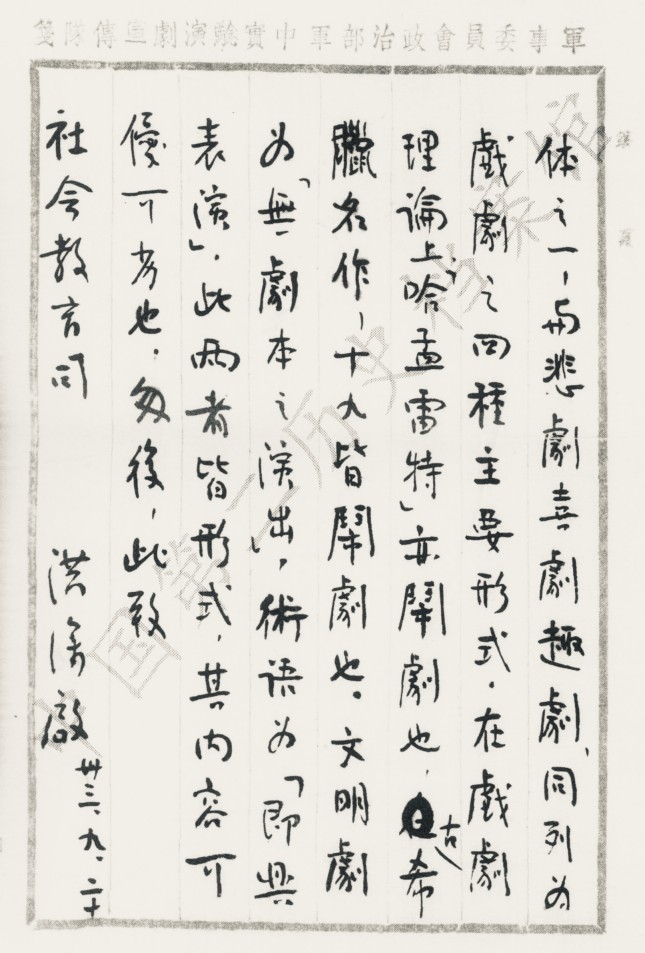
In addition, the letter paper header label of the letter contains the words "The Political Drama Propaganda Team of the Political Department of the Military Commission", which also shows another identity when Hong Shen's writing -then the third "Ministry of Political Department of the Military Commission" third. The director of the Department of Drama and the Standing Committee of the Drama Instructor Committee is responsible for the work of drama director. The third hall of the "Military Commission's Political Department" is a literary organization established under the promotion of the Anti -Japanese National United Front with the KMT and the Communist Party of China. Literary and artistic groups that conduct anti -Japanese propaganda are called "the Kuomintang Military Commission Political Department Political Department's Anti -enemy Performing Drama Propaganda Team". It is worth mentioning that when the team was formed in Wuchang in 1938, 10 anti -enemy "play teams" and 4 anti -enemy "propaganda teams" were established separately. After the "South Anhui Incident" Under the main force, it was merged into the "Anti -enemy Paradox Propaganda Team". (Lu Fu "Mr. Hong Shen's Revelation of Me in Director and Organization Work", "Hong Shen: Memories Hongshen Album", China Literature and History Publishing House, 1991, pp. 45-55) This two short letter Hong Shen's unsatisfactory contribution to Chinese drama education and drama movement, and under a special historical background, Hong Shen used drama as a blade to promote the useful practice of anti -Japanese and inspiring people's hearts. Hong Shen is not only the pioneer of the Chinese drama movement, but also the model of literary and art workers. (The author is a doctoral student in 2019, the School of Literature, Nanjing University, assistant researcher at the Institute of Filmology, the School of Literature and Journalism of Sichuan University)
Author: Gao Na
Edit: Zhou Yiqian
Editor in charge: Zhu Zilong
*Wenhui exclusive manuscript, please indicate the source for reprinting.
- END -
"Tibetan corner" pocket book
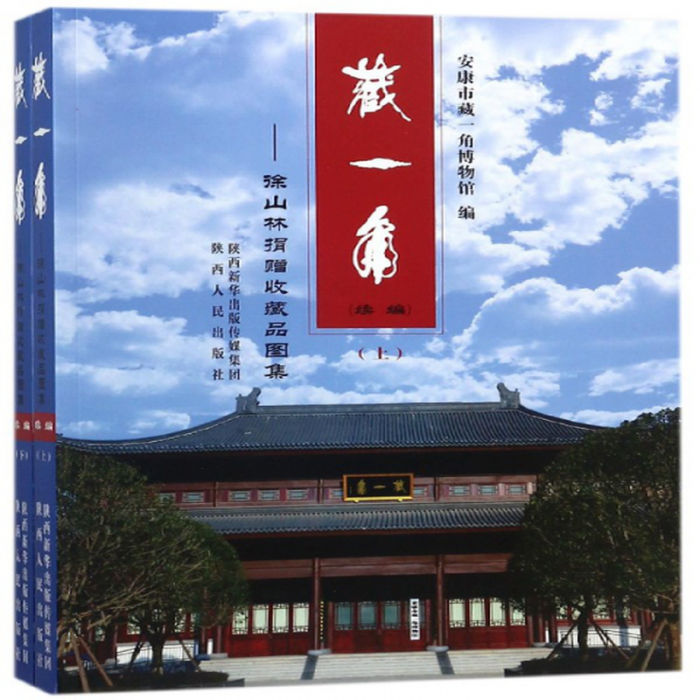
Wen Tu/Li HuanlongIn the Book Roll Clouds exhibition room of the Museum of Hidden ...
Lile and Music Shandong | Jinan: 2022 Zhangqiu District 11th Plaza Fitness Dance Contest (rematch) wonderful performance
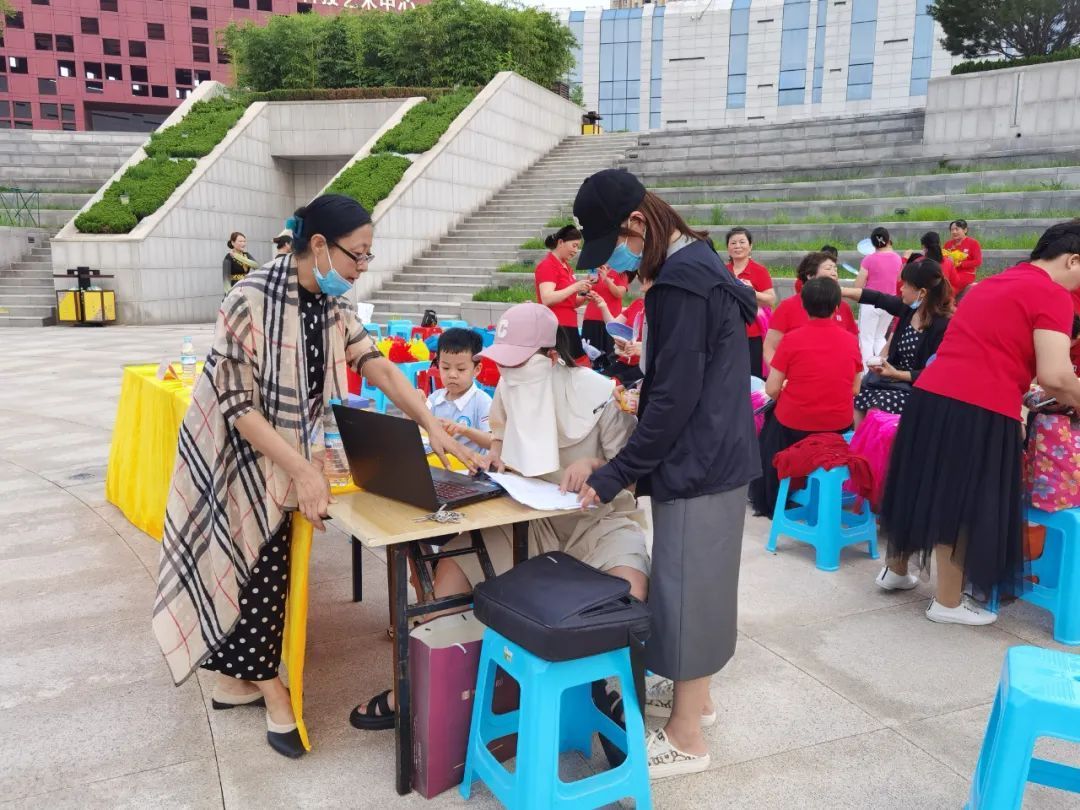
The staff of the Literary Training Department came to Green Island Plaza early to ...